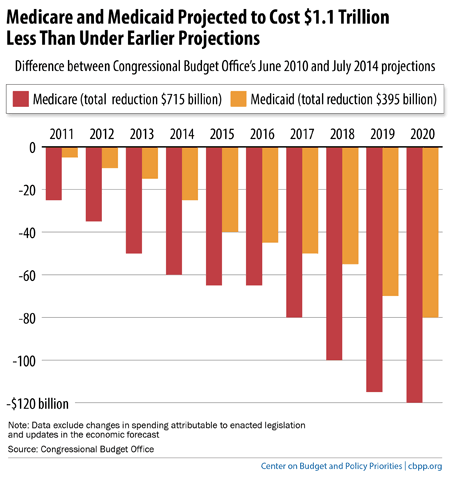BEYOND THE NUMBERS
A recent analysis by Senate Budget Committee Republican staff that claims health reform will increase the deficit rests on two dubious propositions. Under more reasonable assumptions, health reform will reduce the deficit, as the Congressional Budget Office (CBO) and Joint Committee on Taxation have consistently estimated. Just a few months ago, CBO Director Douglas Elmendorf wrote, “the agencies have no reason to think that their initial assessment that [health reform] would reduce budget deficits was incorrect.”
How did the Senate Budget Committee’s Republican staff reach such a different conclusion?
First, they produced an estimate of savings from the health reform provisions that reduce Medicare and other program costs that’s significantly lower than CBO’s. They did so by assuming that health reform had nothing whatsoever to do with the substantial slowdown in health care cost growth in the past few years. That slowdown has led CBO since 2010 to lower its projections of Medicare and Medicaid spending by $1.1 trillion over this decade (see graph).

The decline in projected Medicare spending means that health reform provisions that cut Medicare costs directly will save less than previously thought. (A provision that reduces Medicare costs by a certain percentage will save fewer dollars if that percentage cut is applied to a smaller base of costs.) But the Senate Republican analysis lowers CBO’s estimate of health reform’s Medicare savings to reflect that effect alone, as though not one dollar of the savings from the slowdown in health costs were due to health reform’s focus on reducing cost growth in the U.S. health care system.
As Kaiser Family Foundation President Drew Altman has written, “Even though its direct effects on system-wide costs may be limited so far, I believe Obamacare is having a significant indirect effect, although cause and effect and the magnitude are hard to prove. . . . [It] is entirely likely that Obamacare has played and will continue to play a role in the slowdown in health-care cost growth and accelerating market change.”
Even under the conservative assumption that health reform accounts for only a small part of the slowdown in health care costs, it would more than offset the Senate Republicans’ reduction in health reform’s estimated Medicare savings
Second, the Senate Republican analysis overstates the budgetary impact of changes in labor supply (that is, the total hours of work that workers choose to supply) under health reform. CBO estimates that health reform will cause a small reduction in the labor supply, in significant part because some people who now work mainly to obtain health insurance — a situation known as “job lock” — will choose to retire earlier or work somewhat less; that reduction will shrink total labor compensation by roughly 1 percent from 2017 through 2024, according to CBO. The Senate Republican analysis assumes that the overall amount of income subject to tax will drop by the same percentage.
But wages and salaries, in fact, represent only about 70 percent of adjusted gross income, which also includes interest, dividends, rental income, capital gains, and some retirement distributions. Thus, a 1-percent cut in labor compensation would shrink tax revenues by much less than 1 percent.
Correcting the Senate Republican staff analysis for these two factors shows that health reform will still reduce the deficit, as CBO has estimated — not increase it. Those who seek the best assessment of the fiscal impacts of health reform should stick with CBO’s.
